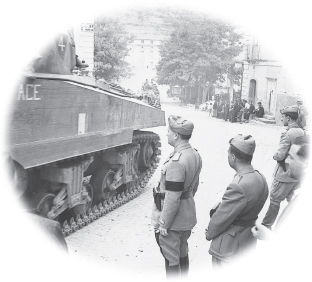
Полная версия
Whicker’s War
Towards the evening of D-Day I rounded up a few sergeant-cameramen who had landed nearby with other units and we settled in a field for our first European brew-up. On went the tea in its regulation sooty billycan and the bacon sizzled, supported by our first trophy of war: fat Sicilian tomatoes. A few Messerschmidts came over and did what they could, bombing ships and strafing beaches, but I don’t think my new Scottish friends of the 51st Division suffered many casualties. Our surprise had been total.
At dusk, finding our blankets were still somewhere at sea, we settled down on the damp rocky soil of the tomato grove and in an unnatural silence, slept uneasily.
Such lack of enemy opposition was unexpected – and so of course was the hidden fact that, after this first easy day, it was going to take another 665 days to fight our way up the length of Italy, from Pachino to the Swiss frontier by way of Catania, Messina, Salerno, Naples, Anzio, Rome, Florence, through the Gothic Line and out into the Po Valley, to Milan and Venice … and victory?
I did not know that I faced 22 months of battle that was going to provide some of the worst experiences of my life – and a few of the best.
THEY ENLISTED THE GODFATHER…

The stunning thud of bombs shook us awake. The lurid nightscape was bright as day. We jumped up in alarm, our shadows stretching out before us. The Germans had finally reacted.
Their night bombers were dropping flares and hunting targets. They had plenty. We covered the coastline and were impossible to miss. Attempting to hold them off, thousands of glowing Bofors shells climbed up slowly in lazy arcs through the night sky and into the darkness above the flares. They were pretty enough and encouraged us, but did not seem to worry the Luftwaffe. The invasion fleet and the beaches were bombed all night.
There may be no justice in life, but in battle the percentages go even more out of synch. For instance, my batman-driver Fred Talbot was a regulation cheery Cockney sparrer and peacetime bus driver. We saw a lot of war together, without a cross word.
During the planning for the invasion he had been much relieved to learn that, while I was directing our team and carrying my camera along with the first wave of infantry ashore, when I could reasonably expect to get my head knocked-off … there would be no room for him. He would have to stay behind with our loaded jeep and sail across in the relative comfort of a larger, safer transport ship. This would land with some dignity a day or two later, when hopefully the shot ‘n’ shell would have moved on. It was just his good luck, and he was duly thankful.
However on invasion day my first wave went in, as I said, to mystifying silence. The worst we got was wet. Meanwhile, Driver Talbot’s ship, preparing to follow the fleet to Sicily and proceeding through the night at a leisurely pace from Sousse towards Sfax and well behind the armada … hit a mine and sank immediately.
Talbot spent some hours in the dark sea before being picked up, and another ten hours in a lifeboat. He was one of the few survivors.
When he caught up with us some days later he was rather rueful about the injustice of it all. I passed a few unnecessary remarks about life sometimes being safer at the sharp end, but understandably Talbot was not amused.
My relief at his return was clouded by the knowledge that our jeep, loaded with everything we possessed, was at the bottom of the Med. Down there in the deep lay the Service Dress and gleaming Sam Browne I had worked so hard to achieve and only worn a few times. Now I had nothing resplendent and should have to attend what I anticipated would be the vibrant social scenes in Rome and Florence in my invasion rig – a bit basic and underdressed for any hospitable Contessa’s welcoming party … War can be cruel.
Then there was my religiously-kept wartime diary. Had those notes brimming with excitement, dates, facts and figures not become an early casualty of war … had that mine not destroyed my tenuous literary patience at a time when life was becoming too busy to sit and think and remember and write … had that ship not sunk – you could have suffered a version of this book half-a-century ago!
Strangely, having lost everything but my life, I felt curiously light-hearted – free and fast-moving. I would recommend travelling light to any Liberator. You sometimes approach this silly carefree mood when an airline has lost your luggage in some unfamiliar city and suddenly you have nothing to carry, or wear, or worry about.
Talbot and I met only once after the war, late one night going home on the District Line, Inner Circle. He was in good shape and told me he was working in Norwich as a ladies’ hairdresser.
Next day, still curiously carefree, I watched General Montgomery and Lord Mountbatten land from their Command ship – the Brass setting foot upon Europe. Our piece of their global war was getting under way and, apart from the bombing, we’d met little opposition – certainly not from the crack Parachute and Panzer Grenadier Divisions we were expecting to attack. We moved inland cautiously.
The Italian defences in our sector seemed admirably sited. Their pillboxes commanded excellent fields of fire, were strongly constructed and most had underground chambers full of ammunition. In main positions were six-inch guns, some made in 1907. All sites were deserted; their crews had melted away.
A handful of small Italian tanks did attempt a few brave sorties but their 37mm guns had no chance against Shermans with 75s and heavy armour.
Fifteen miles from the landing beaches, our first capture on the road north to Syracuse and Catania was Noto, once capital of the region and Sicily’s finest baroque town. Thankfully it was absolutely untouched by war, and bisected by one tree-lined avenue which climbed from the plain up towards the town square and down the other side. We did not know whether this approach had been cleared of enemy and mines, so advanced carefully.
The population emerged equally cautiously, and lined the road. Then they started, hesitantly, to clap – a ripple of applause that followed us into their town.
You clap if you’re approving, without being enthusiastic. Nobody cheered – the welcome was restrained. We were not kissed once – nothing so abandoned. It seemed they didn’t quite know how to handle being conquered.
Like almost every other village and town we were to reach, Noto’s old walls were covered with Fascist slogans. Credere! Obbedire! Combattere! – Believe! Obey! Fight! – was popular, though few of the locals seemed to have got its message. Another which never ceased to irritate me was Il Duce ha sempre ragione – The Leader is always right! Shades of Big Brother to come. Hard to think of a less-accurate statement; we were in Sicily to point out the error in that argument.
Another even less-imaginative piece of propaganda graffiti was just ‘DUCE’, painted on all visible surfaces. As a hill town came in to focus every wall facing the road would be covered with Duces. Such scattergun publicity was a propaganda tribute to Mussolini, the Dictator who by then had already become the victim of his own impotent fantasies. To me he always appeared more a clown than a threat. To his prisoners he was no joke.
In Noto the baroque Town Hall and Cathedral faced each other, giving us a taste of what war-in-Italy was to become: it would be like fighting through a museum.
We filmed one small unexpected ceremony with a carabinieri officer who had discovered a copy of a 1940 speech to the Italians by Churchill. From the steps of the Casa del Fascio he read it out with many a verbal flourish; an intent audience nodded thoughtfully. Churchill had been promoted from ogre to statesman overnight.
Then three British officers arrived and marched up to the town’s War Memorial, where after a respectful silence they gave a formal salute to the commemorated townsfolk who had fallen as our Allies in the Great War. That sensitive and sensible gesture went down very well, and for the first time the applause was real. You could see the Sicilians thinking, ‘Maybe they’re going to be all right, after all!’
Observing both sides in action, I had by now seen enough of the war and the military to appreciate that if you had to be in the army, a film unit was the place to be. It offered as much excitement as you could handle – in some cases, rather more – but also a degree of independence, and even an unmilitary acknowledgement which cut through rank.
We’re all susceptible to cameras, though we may pretend to be disinterested and impatient. (Surely you don’t want to take my picture?) In truth, everyone from General Montgomery down was delighted to be photographed. I spent some time with him during the war and always, as soon as he saw me, he’d start pointing at nothing in particular, but in a most commanding manner. It was his way and it seemed to work; half-a-century ago he had television-style fame, before television.
People do straighten up and pull-in their stomachs when a camera appears. It’s an instant reflex – like beauty queens, for instance. As soon as they see a camera, they smile and wave.
Senior army officers were certainly not given to waving but, not quite understanding what we were doing, tended to approach us with impatient exasperation or amused confusion. Usually when they saw we were quite professional they would submit to direction or just leave us alone – which for a junior officer, was ideal.
We drove north and found the 7th Green Howards had captured a large Italian coastal defence position of 12-inch gun-howitzers which could throw a 6101b shell 20 miles. They were pointing towards our carefree arrival route and positioned to do terrible damage to any invader, but were only as good as their crews – who fortunately were not working that day.
We noticed with some bitterness towards international Arms Kings that they had been manufactured by British Vickers-Armstrong. Our 74th Field Regiment got them firing on German positions outside Catania, the biggest guns the Eighth Army had ever operated – so I suppose it worked out all right in the end.
Another capture worked out equally well, and Sergeant S.A. Gladstone got some expressive pictures of happy troops liberating cellars containing 7,000 gallons of good red wine. As trophies go, this was vintage and generally accepted as even better booty than tomatoes.
After our carefree advance from the beach, resistance had toughened in front of the Eighth Army. German paratroops had been flown in from France and the Hermann Goering Division replaced the timid and apathetic Italians. After tough fighting on the beaches, the Americans enjoyed an easier run through east and central Sicily, then followed the Germans around the giant sentinel of Mount Etna as they pulled back and prepared to retreat to the mainland.
As for our enemies, we soon discovered that the Italians in their rickety little tanks were anxious to become our prisoners, and the Germans in their enormous 57-ton Tiger tanks were anxious to kill us – so at least we knew where we were …
Sergeant Radford and I set off across the island to be in at the capture of Palermo by General Patton’s army. That pugnacious American General had just been in deep trouble after visiting a hospital where he slapped and abused two privates he believed were malingering. The soldiers were said to be suffering, like the rest of us, from ‘battle fatigue’. They had no wounds though one was found to have mild dysentery, yet they seriously affected the war. Patton’s exasperation was demonstrated in front of an accompanying War Correspondent, and the resultant Stateside publicity put the General’s career on hold for a year – and in due course provided a tragic death-knell for Churchill’s Anzio campaign, which needed Patton’s drive and leadership.
As we drove through remote and untouched mountain villages, we were the first Allied soldiers they had seen. Wine was pressed upon us and haircuts (including a friction) cost a couple of cigarettes. Even the almost unsmokable ‘V’ cigarettes made for the Eighth Army in India were eagerly bartered.
In Palermo householders peeped timidly around their curtains, wondering whether our dust-covered khaki was field-grey? The city was peaceful – blue trams were running and the police with swords and tricornes drifted about, as well dressed as Napoleonic officers.
After an RAF visit, the harbour was full of half-sunken gunboats, each surrounded by shoals of large fish. We caught a few by hitting them with stones. Izaac Walton must have been spinning.
Posters showed a monstrous John Bull, the world his rounded stomach as he swallowed more lands. Another was of a grinning skeleton in a British steel helmet. I took pictures of them while passers-by hurried on, fearful lest I turn and blame them.
We returned across Sicily to the Eighth Army HQ on the malarial Lentini plain – indeed a large number of our casualties were from mosquitoes. During the night we felt huge shuddering explosions outside Catania and watched sheets of flame light the sky. The Germans were blowing-up their ammunition dumps – so they were about to start their escape to the mainland.
A new officer had arrived to join us: Lieutenant A.Q. McLaren who, captured in the desert by Rommel’s Afrika Korps while using two cameras, had refused to hand one over because it was personal property and demanded a receipt for the War Office Ikonta. He later escaped, still carrying the receipt.
As we were meeting, an operational message came in saying that Catania was about to fall. We scrambled off to get the pictures. McLaren was driving ahead of me, standing up in the cab of his truck watching for enemy aircraft, as we all had to. This gave a few seconds’ warning if the Luftwaffe swooped down to strafe the road.
We drove in column around the diversion at reeking Dead Horse Corner. In the dust ahead lay a German mine. McLaren’s warning scream came too late. It was his first day in Sicily.
The patient infantry plodding past us moved on silently towards the city. They had seen another violent death and perhaps they too would soon stop a bullet or a shellburst. In an hour or so some of them would also be dead, and they knew it.
The whole direction of their lives now was to reach some unknown place and, if possible, kill any unknown Germans they found there. In battle, death is always present and usually unemotional, and when it approaches, inches can mean the march goes on – or you are still and resting, for ever.
However its proximity does wipe away life’s other problems. Those plodding figures passing Dead Horse Corner and McLaren’s body were not worrying about unpaid bills or promotion or nagging wives or even sergeant majors. Getting through the day alive was achievement enough.
Конец ознакомительного фрагмента.
Текст предоставлен ООО «ЛитРес».
Прочитайте эту книгу целиком, купив полную легальную версию на ЛитРес.
Безопасно оплатить книгу можно банковской картой Visa, MasterCard, Maestro, со счета мобильного телефона, с платежного терминала, в салоне МТС или Связной, через PayPal, WebMoney, Яндекс.Деньги, QIWI Кошелек, бонусными картами или другим удобным Вам способом.




